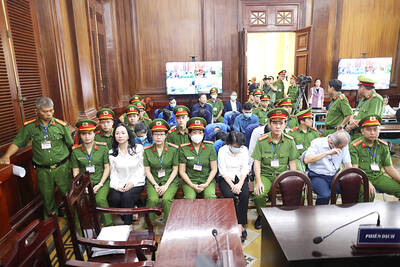New Zealand’s customs agency has fired nine border workers who refused to get the COVID-19 vaccine.
The country has required all frontline border workers to be vaccinated by the end of last month.
In February, New Zealand Prime Minister Jacinda Ardern said the government would not be making the vaccine compulsory for frontline staff and that those who declined the vaccine would be moved into backroom roles.
However, no other work could be found to redeploy the nine workers who were in fixed-term employment at the maritime border, said Jacinda Funnell, New Zealand Customs Service deputy chief executive for people and capability.
“We regret that these individuals have had to leave employment, and understand what a difficult situation this is for them,” Funnell said in a statement.
About 95 percent of customs’ frontline staff who were required to be vaccinated had received their first dose and 85 percent had received the second dose of the vaccine, she said.
Customs had been discussing options with staff since the beginning of March, she said, and had told them that “options for redeployment were very limited, due to no other customs functions existing in the area.”
She said the agency had also explored redeployment options across the wider public service.
A New Zealand Ministry of Health order made under the COVID-19 Public Health Response Act has made it a legal requirement for anyone working in high-risk border environments to be vaccinated by the Saturday deadline.
Last Month, the New Zealand Defence Force threatened to fire service members who refused to get a COVID-19 vaccination.
In correspondence to staff published by Radio New Zealand, New Zealand Defence Force Chief Air Marshal Kevin Short said: “Electing to not meet the baseline immunization readiness criteria will result in a review of an individual’s future service.”
New Zealand’s unions have spoken out against mandatory vaccination.
E tu union has said: “We do not support mandatory vaccination and will not tolerate discrimination against workers who choose not to vaccinate.”
The Public Service Association union has said unvaccinated border staff “should be redeployed, and their employment rights must be protected.”
In related news, New Zealand is to open a travel bubble with the tiny Cook Islands this month, adopting quarantine-free arrangements similar to those already established with Australia, Ardern said.
The bubble with the South Pacific island state of about 20,000 people would open on May 17 and initially involve about three flights a week, Ardern said.
“Two-way quarantine-free travel is a significant step in both countries’ COVID-19 recovery, and a direct result of both New Zealand and the Cook Islands’ successful response to the pandemic,” she said.
The remote Cook Islands is one of few places in the world to remain coronavirus-free, while New Zealand has eliminated community transmission and recorded only 25 deaths in a population of 5 million.
The Cook Islands is self-governing in “free association” with New Zealand, meaning that while it administers its own affairs, Cook Islanders are both New Zealand citizens and Cook Islands nationals.
As a result, there are more expatriate Cook Islanders living in New Zealand than on the islands.
“[The bubble] will mean families can reconnect, commercial arrangements can resume and Kiwis can take a much-welcomed winter break and support the Cook Islands’ tourism sector and recovery,” Ardern said.
A long-awaited travel bubble between New Zealand and Australia opened last month, and has been hailed as a major milestone in restarting the global travel industry.
New Zealand opposition leader Judith Collins said Wellington should prioritize opening travel bubbles with Tonga and Samoa, two Pacific island nations that have detected no community cases of COVID-19.

Republican US lawmakers on Friday criticized US President Joe Biden’s administration after sanctioned Chinese telecoms equipment giant Huawei unveiled a laptop this week powered by an Intel artificial intelligence (AI) chip. The US placed Huawei on a trade restriction list in 2019 for contravening Iran sanctions, part of a broader effort to hobble Beijing’s technological advances. Placement on the list means the company’s suppliers have to seek a special, difficult-to-obtain license before shipping to it. One such license, issued by then-US president Donald Trump’s administration, has allowed Intel to ship central processors to Huawei for use in laptops since 2020. China hardliners

A top Vietnamese property tycoon was on Thursday sentenced to death in one of the biggest corruption cases in history, with an estimated US$27 billion in damages. A panel of three hand-picked jurors and two judges rejected all defense arguments by Truong My Lan, chair of major developer Van Thinh Phat, who was found guilty of swindling cash from Saigon Commercial Bank (SCB) over a decade. “The defendant’s actions ... eroded people’s trust in the leadership of the [Communist] Party and state,” read the verdict at the trial in Ho Chi Minh City. After the five-week trial, 85 others were also sentenced on

Conjoined twins Lori and George Schappell, who pursued separate careers, interests and relationships during lives that defied medical expectations, died this month in Pennsylvania, funeral home officials said. They were 62. The twins, listed by Guinness World Records as the oldest living conjoined twins, died on April 7 at the Hospital of the University of Pennsylvania, obituaries posted by Leibensperger Funeral Homes of Hamburg said. The cause of death was not detailed. “When we were born, the doctors didn’t think we’d make 30, but we proved them wrong,” Lori said in an interview when they turned 50, the Philadelphia Inquirer reported. The

RAMPAGE: A Palestinian man was left dead after dozens of Israeli settlers searching for a missing 14-year-old boy stormed a village in the Israeli-occupied West Bank US President Joe Biden on Friday said he expected Iran to attack Israel “sooner, rather than later” and warned Tehran not to proceed. Asked by reporters about his message to Iran, Biden simply said: “Don’t,” underscoring Washington’s commitment to defend Israel. “We are devoted to the defense of Israel. We will support Israel. We will help defend Israel and Iran will not succeed,” he said. Biden said he would not divulge secure information, but said his expectation was that an attack could come “sooner, rather than later.” Israel braced on Friday for an attack by Iran or its proxies as warnings grew of